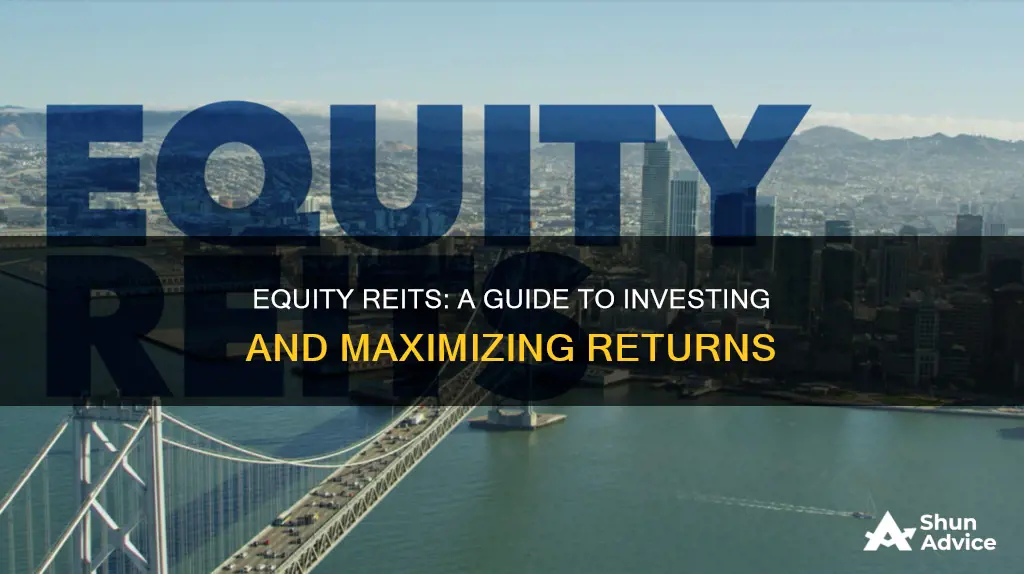
Real estate investment trusts (REITs) are a way for individuals to invest in large-scale, income-producing real estate without actually buying and managing properties themselves. They are a company that owns and typically operates income-producing real estate or related assets, including office buildings, shopping malls, apartments, hotels, resorts, self-storage facilities, and warehouses.
REITs are required to meet certain standards set by the IRS, including that they return a minimum of 90% of taxable income in the form of shareholder dividends each year, invest at least 75% of total assets in real estate or cash, and receive at least 75% of gross income from real estate.
There are three types of REITs: equity REITs, mortgage REITs, and hybrid REITs. Equity REITs are indirect investment vehicles that own or operate income-producing commercial real estate, while mortgage REITs primarily invest in bonds backed by home mortgages. Hybrid REITs own and finance properties, using both strategies to generate income.
Publicly traded REITs are the most common type of REIT and are traded on major stock exchanges. They tend to have better governance standards and be more transparent, and they offer the most liquid stock. Public non-traded REITs are registered with the SEC but are not available on an exchange, while private REITs are not registered with security regulators and are usually bought directly from the REIT sponsor.
REITs provide a way for investors to gain exposure to a diversified portfolio of income-producing commercial real estate while relying on professional managers to select and manage the properties. They also provide an attractive dividend yield that is higher than the overall stock market.
| Characteristics | Values |
|---|---|
| Definition | Real estate investment trusts, or equity REITs, are indirect investment vehicles that own or operate income-producing commercial real estate. |
| Examples | Office buildings, shopping centres, apartments, hotels, resorts, self-storage facilities, warehouses, mortgages or loans |
| Taxation | REITs are required to distribute at least 90% of taxable income to shareholders as dividends. REIT companies pay no taxes, but investors must pay taxes on dividends received. |
| Liquidity | Publicly traded REITs are liquid and can be sold during market trading days. Non-traded and private REITs are illiquid. |
| Risk | Equity REITs have a similar risk profile to stocks. They suffered a 60% loss during the 2008-2009 financial crisis. |
| Returns | REITs have historically returned 5.0% to 7.0% annually over the past decade. |
| Investment Options | Individuals can invest in REITs by purchasing shares of publicly traded REIT stocks, mutual funds, or exchange-traded funds (ETFs). |
| Management | Equity REITs are managed by a professional money management team that selects the direct real estate investment properties. |
| Advantages | High-yield dividends, portfolio diversification, liquidity, steady income. |
| Disadvantages | Tax liability, sensitivity to interest rates, property-specific risks, high fees and account minimums for non-traded and private REITs. |
What You'll Learn

Publicly traded vs non-traded REITs
Publicly Traded vs. Non-Traded REITs
Real Estate Investment Trusts (REITs) are a popular investment vehicle, providing diversification, a regular income stream, and access to institutional-grade real estate investments. There are three main types of REITs: publicly traded, non-traded, and private. This article will focus on the differences between publicly traded and non-traded REITs.
Publicly traded REITs are listed on major stock exchanges, such as the New York Stock Exchange (NYSE) or NASDAQ. They are highly liquid, easily bought and sold with standard trading fees. There is no accreditation requirement, meaning anyone can invest. The value of publicly traded REITs is determined by the market and changes daily, making them highly correlated with the stock market and subject to market volatility. Managers of publicly traded REITs may focus more on producing short-term earnings rather than long-term growth. These trusts are registered with and regulated by the Securities and Exchange Commission (SEC) and are required to make regular disclosures, including audited financial reports.
Non-traded REITs are not listed on public exchanges but are still registered with the SEC and subject to the same regulations and reporting requirements as publicly traded REITs. They are available to all investors, regardless of accreditation. However, shares of non-traded REITs are typically sold through broker-dealers who may charge high upfront fees, and selling shares can be challenging. Non-traded REITs have a low correlation with the stock market, which can help diversify investor portfolios. The value of a non-traded REIT is determined by an appraisal of the properties owned by the trust, and managers can focus on long-term investment goals.
In summary, publicly traded REITs offer high liquidity and accessibility to investors but are subject to market volatility. On the other hand, non-traded REITs provide a long-term investment focus and diversification benefits but come with higher fees and reduced liquidity. The choice between the two depends on the investor's knowledge, experience, and financial situation.
Building an Ally Investment Portfolio: A Guide
You may want to see also

How to buy and sell REITs
Real Estate Investment Trusts (REITs) allow investors to put their money in commercial real estate without actually having to buy and manage properties themselves. They are companies that own real estate, and investors can buy shares in REITs in a similar way to stocks.
REITs are required to return a minimum of 90% of their taxable income to investors in the form of shareholder dividends each year. This makes them an attractive investment option, as they consistently offer some of the highest dividend yields in the stock market.
There are three broad categories of REITs, defined by their investment holdings: equity, mortgage, and hybrid.
Buying REITs
REITs can be purchased in a variety of ways, including:
- Buying shares of publicly traded REIT stocks, which are listed on major stock exchanges.
- Buying shares in a REIT mutual fund or exchange-traded fund (ETF).
- Investing in public non-listed REITs and private REITs.
Selling REITs
If you buy shares of a publicly traded REIT, you can sell them as and when you please. However, if you invest in a public or private non-traded REIT, you generally cannot sell at any time. These investments are less liquid and often have lengthy holding periods.
Publicly traded REITs are far easier to buy and sell than the process of buying, managing, and selling commercial properties. They are also more liquid than non-traded and private REITs, which may have minimum investments of $25,000 or more.
A secondary market for non-listed REITs was created over 20 years ago to help provide liquidity.
Saving and Investing: Pros, Cons, and Your Money
You may want to see also

Understanding fees and taxes
Real estate investment trusts (REITs) are a popular way to invest in income-generating real estate without directly buying or managing properties. They are also popular because of their generous income streams. However, it's important to understand the fees and taxes associated with REITs before investing.
One of the key features of REITs is that they must distribute at least 90% of their taxable income to shareholders. This means that most REITs don't pay corporate income taxes. Instead, the income is passed on to investors as dividend payments, which are then taxed as ordinary income at the marginal tax rate. These dividends can also be classified as capital gains or a return of capital, which have different tax treatments.
When investing in a REIT, it's essential to consider the fees involved. There may be investment minimums and management fees associated with REIT funds, such as index funds, ETFs, and mutual funds. These fees can vary depending on the fund, so it's important to compare them before investing. Additionally, some platforms that specialise in non-traded REITs may have higher minimum investment requirements and may charge redemption fees if the holding is sold within the first few years of ownership.
It's also worth noting that REIT dividends may be subject to different tax treatments depending on the investor's country of residence. For example, non-U.S. residents may be subject to a 30% withholding tax on their REIT income, although a reduced rate or exemption may apply if there is a tax treaty between the U.S. and their country of residence.
Overall, while REITs offer a great opportunity to invest in real estate, it's crucial to understand the associated fees and tax implications before investing. Consulting with a financial advisor can help investors make informed decisions about REIT investments and how they fit into their overall financial goals and tax situation.
How Investments Boost Owners' Equity
You may want to see also

REITs' benefits and risks
Benefits of Equity REITs:
Equity REITs offer investors a range of benefits, including:
- Diversification of investment portfolios: Equity REITs allow investors to gain exposure to a diversified portfolio of income-producing commercial real estate. By investing in REITs, investors can reduce the risk associated with other types of assets, such as stocks, which tend to be more volatile in the short term.
- Regular income: As REITs are required to distribute at least 90% of their taxable income to shareholders, investors can benefit from regular dividend payments. This makes REITs an attractive option for those seeking passive income, such as retirees.
- Liquidity: Shares of publicly listed REITs are easily traded on major stock exchanges, providing investors with flexibility and access to cash if needed.
- Long-term capital appreciation: In addition to regular dividend income, REIT investors can benefit from long-term capital appreciation, with some REITs offering moderate, long-term capital appreciation potential.
- Transparency: Publicly traded REITs are subject to oversight by independent directors, analysts, auditors, and the financial media, providing investors with transparency and protection.
- Low fees: Publicly traded REITs typically have low fees, with many online brokers not charging trading commissions.
- Professional management: Equity REITs are indirect investment vehicles, meaning there is a professional money management team that selects and manages the properties on behalf of REIT shareholders.
Risks of Equity REITs:
While Equity REITs offer a range of benefits, there are also several risks to consider:
- Interest rate risk: A rise in interest rates may reduce demand for REITs as investors may choose alternative investments with fixed interest rates, such as U.S. Treasuries.
- Sector risk: Investing in REITs concentrated in a particular sector, such as retail or hospitality, can be risky if that sector is negatively impacted by market changes. For example, the rise of online shopping may negatively impact REITs focused on suburban malls.
- Taxes: REIT dividends are taxed as ordinary income, which is typically higher than dividend tax rates or capital gains taxes for stocks. This can result in a higher and more consistent tax bill for investors.
- Lack of control: Investors have no say in how a REIT invests its money or manages its properties, which may result in a lack of diversification if not carefully selected.
- High fees for non-traded REITs: While publicly traded REITs have low fees, non-listed or private REITs may charge upfront costs of up to 11% or more, as well as annual management fees of around 2%.
- Illiquidity of non-traded REITs: Non-traded REITs are not publicly traded, making it difficult to determine their value and find buyers or sellers when needed. These REITs may also have lengthy holding periods, with some unable to be sold for at least 10 years.
Investment Management Style: Strategies and Approaches
You may want to see also

How to invest in equity REITs
Equity real estate investment trusts (REITs) are indirect investment vehicles that own or operate income-producing commercial real estate. They are a great way to diversify your portfolio, as they have a low correlation with other types of equity and fixed-income assets.
There are several ways to invest in equity REITs:
- Publicly traded REITs: These are traded on a stock exchange, just like any other public stock. You can buy shares in a publicly traded REIT through a broker, and they tend to be more transparent and have better governance standards.
- Public non-traded REITs: These are registered with the SEC but are not available on an exchange. They can be purchased from a broker that participates in public non-traded offerings, such as Fundrise or DiversyFund. These REITs tend to be highly illiquid and may have higher fees.
- Private REITs: Private REITs are not registered with security regulators and are usually bought directly from the REIT sponsor. They are less liquid than public REITs because their shares have to be repurchased by the fund sponsor.
- Mutual funds: You can also invest in an equity REIT mutual fund, where a fund manager selects individual REITs that they believe will outperform the index.
- Exchange-traded funds (ETFs): An equity REIT ETF is a low-cost way to invest in a diversified public REIT portfolio. There are equity REIT ETFs that track REITs in a specific country and globally.
It's important to note that investing in equity REITs carries risks, including potential tax liabilities, sensitivity to interest rates, and property-specific risks. Additionally, non-traded and private REITs may be difficult to value and have higher account minimums.
Golem Investment Guide for Indians: Get Started Now
You may want to see also
Frequently asked questions
Equity REITs are indirect investment vehicles that own and operate income-producing commercial real estate, such as office buildings, shopping centres, and apartments. They differ from Mortgage REITs, which primarily invest in bonds backed by home mortgages.
You can research and invest in individual public REITs, or you can invest in an Equity REIT mutual fund or exchange-traded fund (ETF). To do so, you must open a brokerage or investment account.
Equity REITs allow investors to benefit from a diversified portfolio of income-producing commercial real estate while relying on professional managers to select and manage the properties. They also provide an attractive dividend yield, higher than the overall stock market.
Equity REITs have a similar risk profile to stocks. They suffered a loss of 60% during the 2008-2009 financial crisis and it took almost four years to recoup those losses. Additionally, they may have high taxes and investment minimums, fees, and declining values if the real estate market cools.
When choosing a REIT to invest in, consider the following: dividend yield, price-to-funds-from-operations, and price-to-net-asset-value. You should also analyse the REIT's financial footing by reviewing its net asset value and debt-to-equity ratio.







